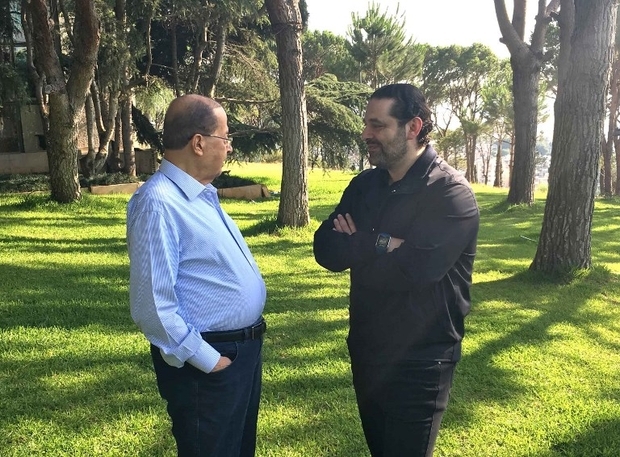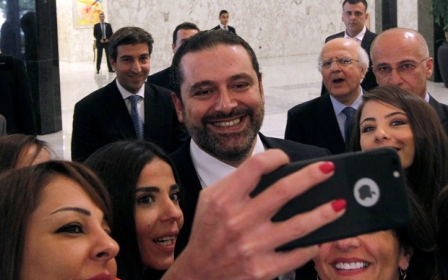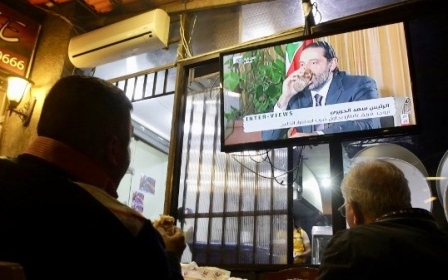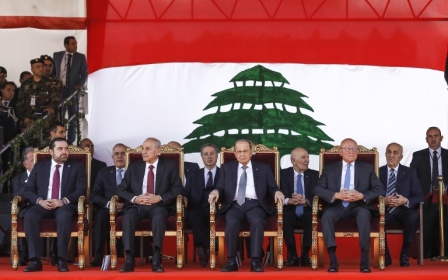Hariri's exit strategy: The ball is in Hezbollah's court
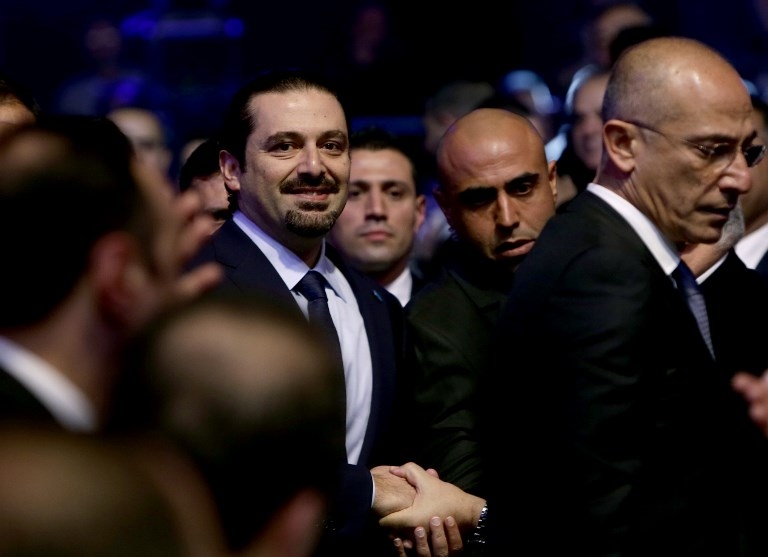
The interview given by Lebanese Prime Minister Saad Hariri on Sunday night was meant to alleviate concerns about his status in Saudi Arabia. In the interview, Hariri emphasised that, contrary to public speculation, he is a free man and that he would return to Lebanon in "a few days".
However, media pundits, analysts as well as the Lebanese President Michel Aoun responded by painting it as inauthentic and as further "proof" that Hariri is being coerced into making public statements by the Saudi authorities.
Public relations war
The media storm around Hariri’s interview underlines how, since announcing his resignation on 4 November, the whole debate surrounding his resignation has been built on three main implausible narratives. Instead of taking these narratives at face value, the "Hariri incident" should be more accurately read as a public relations war between Saudi Arabia and Iran.
The first implausible narrative is that the harsh statement given by Hariri about Iran's meddling in Lebanese affairs, followed by Saudi accusations that the Lebanese government was "declaring war" on Saudi Arabia, meant that military confrontation between Saudi Arabia and Iran, whether direct or through proxies, was imminent.
The narrative is built on turning Lebanon into a military battleground, with Saudi Arabia blessing an Israeli attack on Hezbollah to weaken the latter and by extension Iran’s influence in the Levant. But it is neither in Israel's nor in Iran's interest for such a confrontation to take place.
The 2006 war illustrated that military attacks on Hezbollah only serve to strengthen it. Additionally, no matter the alignment between Saudi Arabia and Israel on Iran, Israel will never fight Saudi Arabia's war on its behalf.
With Saudi Arabia still heavily involved in Yemen, it is also unlikely that Saudi Arabia will engage militarily against Iran's proxies in Syria.
Iran meddling, Saudi meddling
The second implausible narrative is that Hezbollah and Lebanese allies are outraged by Saudi Arabia's treatment of Saad Hariri. Hezbollah leader Hassan Nasrallah expressed concern about the wellbeing of Hariri, presenting himself as an elder statesman calling for calm.
He spoke against Saudi Arabia's meddling in Lebanese affairs, painting Hariri as being coerced by Riyadh to make decisions he does not personally endorse. In so doing, Nasrallah presented his position in Lebanese nationalist terms.
This narrative was only strengthened by intense speculation about Hariri's status among his supporters who, in questioning Saudi Arabia's motives, diverted attention away from the fact that Iran's meddling in Lebanon is far greater than that of any other foreign power.
The delay in Hariri's response paved the way for Iran and Hezbollah to build up their narrative, but this was a tactical delay
The Lebanese president further strengthened Hezbollah's narrative by saying he would only accept Hariri's resignation if submitted in person, then calling on Lebanese television stations to not broadcast Hariri's interview on the basis that it is staged.
Hezbollah and Aoun's moves conveyed a desire to protect Lebanon's sovereignty but they glossed over Hezbollah's and Aoun's role in weakening Hariri and his allies in Lebanon.
While Iran and Hezbollah may have cleverly managed to spin the story of Hariri’s resignation to frame themselves as taking the moral high ground, they were, nonetheless, outmanoeuvred by Hariri in his interview.
Exit strategy
Hariri capitalised on Hezbollah's declared demand for him to resume his position as prime minister to present an exit strategy: he would reconsider his political role if Hezbollah gave up its regional role in Syria and Yemen.
But this narrative is just as implausible as the previous two. Hezbollah's fight alongside the Syrian government is about retaining the group's lifeline that relies on securing Iran's supply of weapons through Syria.
In Yemen, Iran found in the Houthis a convenient way to stand up to Saudi Arabia at a low cost. Saudi Arabia's inability so far to win the war militarily has given Iran the upper hand in that conflict. Similarly, in Syria, Iran and its allies also feel they are more successful than their opponents.
Both cases mean that Iran is unlikely to agree to a compromise to end the conflicts.
Hariri's exit strategy is therefore more about stripping Iran's and Hezbollah's of their pretensions than about presenting an implementable roadmap for ending the resignation crisis.
The delay in Hariri's response paved the way for Iran and Hezbollah to build up their narrative, but this was a tactical delay. The more their narrative gained traction, the more his exit strategy showed that this narrative was without basis.
There is no doubt that Hariri's statements are carefully coordinated with Saudi Arabia. But the real story is not whether Hariri is under Saudi Arabia’s mercy. It is that Saudi Arabia is using the Hariri case to hold Iran accountable.
Following Hariri's interview, the ball is now in Iran's and Hezbollah's court to present a plausible narrative for ending the crisis.
But as Iran is not going to accept the end of Hezbollah's role in Yemen or Syria, any response it gives will only be used by Saudi Arabia to declare victory in this public relations battle.
- Lina Khatib is the head of the Middle East and North Africa Programme at Chatham House. You can follow her on Twitter @LinaKhatibUK.
The views expressed in this article belong to the author and do not necessarily reflect the editorial policy of Middle East Eye.
Photo: Saad Hariri arrives to deliver a speech during a gathering to mark the tenth anniversary of the assassination of his father and former prime minister Rafiq Hariri, on 14 February 2015, at the Biel Convention Centre in downtown Beirut (AFP)
Middle East Eye propose une couverture et une analyse indépendantes et incomparables du Moyen-Orient, de l’Afrique du Nord et d’autres régions du monde. Pour en savoir plus sur la reprise de ce contenu et les frais qui s’appliquent, veuillez remplir ce formulaire [en anglais]. Pour en savoir plus sur MEE, cliquez ici [en anglais].



